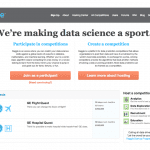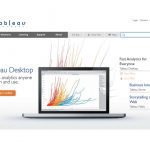Company DataSift Address 100 First St. Suite 360 San Francisco - USA Founders Nick Halstead Founded September 2010 Funding $ 29.7 million Employees 56 Website www.datasift.com Rating 6 bits DataSift offers several tools to extract value from social data. The data that consumers leave on all different social networks is exploding and with DataSift it … [Read more...] about DataSift Offers Several tools to Extract Value From Social Data
Big Data
Learn everything you need to know about big data. Find out how companies are using this revolutionary technology and what it means for your business strategy.
Big Data Startup Kaggle Turns Data Science Into a Challenge
Company Kaggle Address 188 King St. San Francisco - USA Founders Anthony Goldbloom Founded April 2010 Funding $ 11 million Employees 5 Website www.kaggle.com Rating 8 bits Kaggle makes data science a sport. They allow everyone to set-up competitions that challenges the worlds best researches and statisticians. These bright minds can work together or … [Read more...] about Big Data Startup Kaggle Turns Data Science Into a Challenge
Tableau Software Offers Easy-to-Use Analytics & Visualization
Company Tableau Software Address 837 North 34th Street Suite 400 Seattle - USA Founders Christian Chabot, Dr. Chris Stolte, Dr. Pat Hanrahan Founded January 2003 Funding IPO Employees 700 Website www.tableausoftware.com Rating 8 bits Tableau Software provides easy-to-use software applications for fast analytics and visualization. Their goal is to help … [Read more...] about Tableau Software Offers Easy-to-Use Analytics & Visualization
Metamarkets Helps to Spot trends, Analyse & Visualize Data
Company Metamarkets Address 625 2nd Street Suite 230 San Francisco - USA Founders Michael Driscoll & David Soloff Founded May 2010 Funding $ 23.5 million Employees 25 Website www.metamarkets.com Rating 7 bits Metamarkets helps buyers and sellers of online advertising to spot trends, drill down on data, visualize insights and make better decisions. They do … [Read more...] about Metamarkets Helps to Spot trends, Analyse & Visualize Data
Platfora Turns Raw Data into Meaningful & Valuable Information
Company Platfora Address 100 S Ellsworth St Suite 400 San Mateo - USA Founders Ben Werther & John Eshleman Founded Augustus 2011 Funding $ 27.2 million Employees 16 Website www.platfora.com Rating 5 bits More information is created every day and the need to understand this data is growing with a lot of companies. Big data provides valuable opportunities … [Read more...] about Platfora Turns Raw Data into Meaningful & Valuable Information
What is big data?
Big data is a term that refers to the massive amount of digital data created and shared every day. Big data can transform how we live, work, and communicate. It can be used to improve everything from public health and urban planning to business and marketing.
Big data is also changing the way we think about privacy and security. The volume, velocity, and variety of big data present challenges and opportunities for organizations and individuals. Regardless, big data is here to stay, and its impact will only continue to grow in the years to come.
What is big data analytics?
Big data analytics is the process of turning large, complex data sets into actionable insights. Businesses use various analytical tools and techniques, including machine learning and statistical analysis, to do this.
Big data analytics can be used to improve decision-making in areas like marketing, operations, and customer service. It can also be used to identify new business opportunities and optimize existing processes. With the help of big data analysis, businesses can gain a competitive edge by using their data better.
Want to learn more about big data? Datafloq has courses available. Contact us to get started.
When was big data introduced?
The term big data was coined in the 1990s, with some giving credit to John Mashey for popularizing the term. However, the concept of big data has been around for much longer.
Where does big data come from?
In the early days of computing, scientists and businesses began to realize that the amount of data being generated was increasing exponentially. As a result, they began to develop new methods for storing and processing data.
Over time, these methods have become increasingly sophisticated and have played a key role in enabling businesses to make sense of vast amounts of information. Today, big data is used in various industries, from retail to healthcare, and its importance is only likely to grow in the years to come.
What are examples of big data?
One of the most common examples of big data is social media data. With over 2 billion active users, Facebook generates a huge amount of data every day. This includes information on user interactions, posts, and even location data. Analyzing this data can help companies better understand their customers and target their marketing efforts.
Another example of big data is GPS signals. These signals are constantly being generated by devices like cell phones and fitness trackers. When combined with other data sets, GPS signals can be used to provide insights into everything from traffic patterns to human behavior. Finally, weather patterns are another type of big data set. By tracking these patterns over time, scientists can better understand the impact of climate change and develop strategies for mitigating its effects.
How do companies use big data?
Companies use big data in marketing, product development, and customer service. By analyzing large data sets, businesses can identify patterns and trends that would be otherwise difficult to spot. For example, a company might use big data to track customer behavior patterns to improve its marketing efforts.
Alternatively, a company might use big data to improve its products by identifying areas where customers are most likely to experience problems. For instance, big data can be used to improve customer service by finding pain points in the customer journey. Ultimately, big data provides companies with a valuable tool for gaining insights into their business operations.







